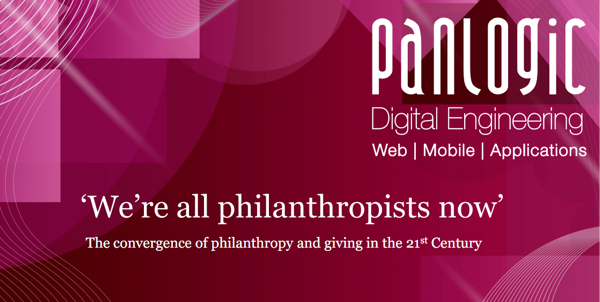Panlogic recently released a report called Digital Philanthropy for the Arts. It’s good – thorough and well-explained and worth recommending to clients as reading material.
The key findings are as follows (and taken directly from the executive summary):
- Emotion is the key reason why people give. Arts organisations need to optimise the giving process to give donors reasons to feel good and to look good in front of their peers
- Technology has changed who gives and how. As a result, Arts organisations need to overcome their demographic prejudices, that too often still focus on monthly direct debits from baby boomers. The Arts world is moving from a model of fewer, high level donations to many, smaller donations.
- Mobile giving is the way forwards. We believe that a national mobile-giving platform (allowing donors to text the amount they wish to donate to an organisation-specific number) would help drive significant impulse donations. Vodafone are leading on this with their JustTextGiving service.
- Arts organisations need to ensure that all the ‘hygiene’ factors within the giving journey are ticked. They must be visibly unflashy and efficient. Their appeals must be explicit and proactive, ideally leveraging their creative talent
- The main reasons for not giving fall within the Arts organisation’s to resolve – so ‘don’t put barriers up’
Elsewhere, I’d recommend the list of barriers to entry cited by organisations (p8) and things that might go wrong (p32). I’d also suggest you read the reasons why people do (pp9-12) and don’t (pp14-16) give and the best practices with regard to donors, digital (generally) and social media (p20 onwards).
The breakdown of the Southbank Centre’s email supporting their Pull Out All The Stops was interesting (and not unfair at all, criticism doesn’t come much more constructive).
In conclusion then, good stuff.
On a related note, JustGiving has revealed average donation values of social media shares. Apparently Facebook drives the most donations and Twitter drives the highest average donations.

“Arts organisations need to optimise the giving process to give donors reasons to feel good and to look good in front of their peers”
I’m reminded of the Skunk Anansie lyric – “just because it feels good, doesn’t make it right.”
There’s something here that concerns me. Something about building on feelings rather than rational decisions and how that’s potentially unstable. If people are giving because it makes them feel good rather than because they’ve made a considered decision that it’s the right thing to do, what does that do to the organisation in question? And how does that effect the long term benefit of having those donors involved in the process?
Another phrase that springs to mind is “infantalisation of donors” though that might be a little strong.
“We’re all philanthropists now” is uncomfortably similar to “We’re all in it together”. Though that may be intentional?
@peteashton
I don’t think they’re suggesting all eggs should be thrown into that basket, just that emotional reasons (local pride, a history with the organisation, caring about their mission) have been found to be a strong motivator. I think that makes sense – I save money and buy insurance for rational reasons; I donate to arts orgs because I care about what they do.
To take that as a call for infantilisation probably is going a bit far. If I’m asked for money towards something then the approach is likely to be better framed as something I might feel good about doing, rather than being sold on it in a more hard-headed way. That can be done without treating me like a child.
It’s also worth noting that ‘donors’ in the report (and the associated ones data was pulled from) doesn’t necessarily refer to wealthy folks who might drop a large sum on an organisation, but also to ticket buyers who might be persuaded to add an extra couple of quid to go towards whatever appeal is running at the time.
The report does get a bit muddled around this area though – for instance, it doesn’t help that the first three reasons why people give are instead ways of giving.
@chrisunitt@peteashton Oh, I’m not trying to draw sweeping conclusions – just had an alarm bell go off (and not just about this matter).
I guess my driving example would be post CiB-shop and WaB where the passionate feeling that it must happen buldozed out any rational considerations about how and whether it was actually a good idea. But that’s a whole ‘nother stinking kettle.
(This commenting system sucks, btw. It’s like Disqus only more annoying.)